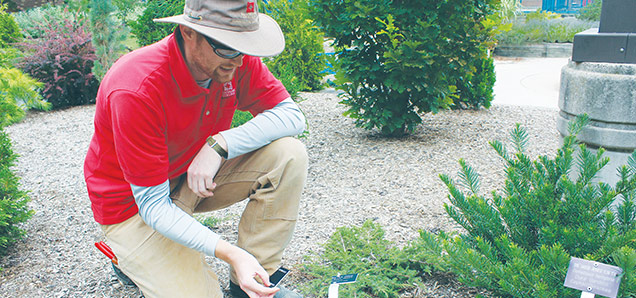On-campus vandalism affects more than you know
 CREDIT: STEPHANIE LAI
CREDIT: STEPHANIE LAISecond-year Horticulture Technician student Eric Abram inspects a broken plant label.
If you look around campus grounds, you may notice the nicely manicured gardens, trees and shrubberies, and just about all else that encompasses Fanshawe's landscape.
It's maintained by students, and it's continually vandalized.
“We've had some incidents over the past few years where vandals snap off trees, pull up plants and generally destroy the landscape,” said Michael Pascoe, professor and coordinator of Fanshawe's Horticulture Technician program. “The entire campus is maintained by students in the Horticulture program.”
A student was caught years ago, and Pascoe used the following analogy to explain how such actions affects his students.
“What if I walked into the classroom and you were working on a drawing, and I ripped it up and left? What would you think? How would you react?”
Perhaps students are unaware that their peers take care of the college grounds.
“It's irrelevant that the Horticulture program maintains it,” said Pascoe. “It hits home for my students when they've planted a tree and they see it destroyed. It's very disheartening for them.”
“Why would anyone destroy a tree?” Pascoe asked.
“I think they perceive it to be a victimless crime,” said Special Constable Brent Arseneault. “Like who cares, it's a flower.”
He estimates that there are more than 300 occurrences of vandalism on campus in the academic year.
But it may not necessarily be Fanshawe students. “If you have a friend come over, they don't really care what happens because it doesn't affect them — it's not their house,” he said. “Fanshawe is our house, and if you start inviting people into our house, they have to understand [that].”
Vandalism doesn't affect grades directly, but “it affects the morale of the program,” said Pascoe.
Second year Horitculture Technician student Eric Abram deemed it “demoralizing.”
“We put a lot of effort [into] maintaining the college grounds,” he said. “I think there's a lot of psychological benefit to having a lot of nice green space on campus.”
“When that sort of thing is damaged, then it hurts everything.”
Popular targets are plant tags, but what students and faculty may not realize is what they're for. “Fanshawe has status as a botanical garden,” said Abram. “The tags have to be maintained and accurate in order to maintain that status as a research and an educational facility.”
“[When] those things get [vandalized], that causes a huge problem for our students,” said Pascoe. “When the students go out to study a plant, [because there's no label] they're not sure. They're disadvantaged on a test because they're not able to review the material.”
“Everything that we do is part of our practical evaluation. Everything that we do is marked,” said Abram.
Arseneault encouraged students to report vandalism when it happens. “The emotional cost is the highest [cost] and the reason being, you're directly impacting another student.”
For Abram, he sees the campus as a shared space. “It's in everybody's interest for them to not just enjoy it, but take a little responsibility for how it's treated.”













